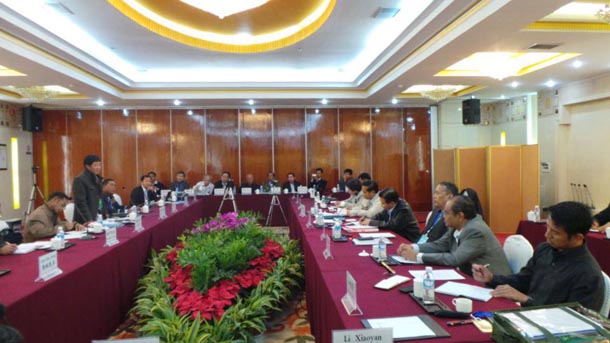A Burmese government delegation led by President’s Office Minister Aung Min is expected to arrive in the northern Thai city of Chiang Mai on Tuesday for a meeting with an umbrella group of ethnic militias from Burma, but Burmese military officials will be conspicuously absent from the gathering.
According to Khun Okkar, the joint-secretary of the ethnic alliance group the United Nationalities Federal Council (UNFC), it is too early to predict the outcome of the one-day meeting.
“We can’t say in advance what the meeting will achieve,” he said, speaking to The Irrawaddy on Monday. “It all depends on what kind of agreement we can reach. We may at least be able to agree to continue the negotiations.”
According to sources from both the UNFC and the government delegation, the government peace team will include Aung Min, Livestock and Fisheries Minister Ohn Myint, Immigration Minister Khin Yi, Deputy Chief Attorney-General Tun Tun Oo and representatives from the government-founded Myanmar Peace Center.
Some government peace brokers from the Myanmar Peace Center have already arrived in Chiang Mai, but Aung Min and other ministers are not expected until tomorrow, according to UNFC sources.
Nyo Ohn Myint of the Myanmar Peace Center said the meeting will focus on laying the groundwork for future talks.
“The two delegations will attempt to reach an agreement over the venue, time frame and agenda of the next union-level talks. The main issue is to discuss how to move forward with the political dialogue,” he said.
The UNFC delegation will include Dr La Ja, general secretary of the Kachin Independence Organization (KIO), whose armed wing has been fighting Burmese government forces for the past 20 months. According to UNFC sources, no KIO officials from the group’s headquarters at Laiza, on the Sino-Burmese border, will attend the meeting on Tuesday.
Representatives from other ethnic groups, including the Mon, Karen, Karenni and Chin, will also join the UNFC delegation.
The Nippon Foundation, a Japanese non-governmental organization, will mediate the meeting. It is believed that the group’s chairman, Yohei Sasakawa, who is also the Japanese government’s goodwill ambassador for the welfare of Burma’s ethnic minorities, will also be present.
Some observers say the absence of Burmese military officials means that it is unlikely that the meeting will do anything to ease the tensions in Kachin State.
The KIO and the government last met in the Chinese city of Ruili on Feb. 4, when the government agreed to initiate a political dialogue with the UNFC before the end of the month.
The Kachin Independence Army, the KIO’s military wing, is the last major ethnic militia still actively engaged in armed conflict with Burma’s government army. It had a ceasefire agreement with the government until fighting broke out in June 2011, ending 17 years of relative peace in the country’s far north and displacing around 90,000 Kachin civilians.
Despite achieving a series of ceasefire agreements with other armed groups since assuming power in early 2011, the current quasi-civilian government of President Thein Sein has yet to propose a long-term solution to ease ethnic tensions in the country.
















